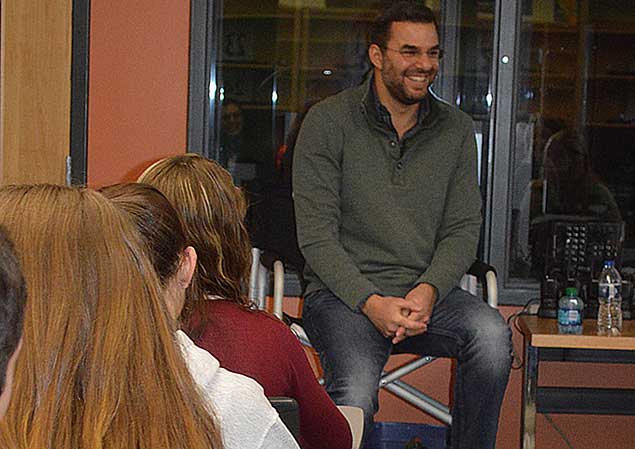Editor’s note: This is a news commentary from SNN reporter and editor Charles Honey, whose children attended Grand Rapids Public Schools.
Also invigorating.
I’m talking about the recent town hall meeting of Rep. Justin Amash, the Republican representative for West Michigan’s 3rd congressional district. An overflow crowd of about 600 was jammed into the auditorium of City High/Middle School, grilling Amash about his co-sponsorship of a bill to abolish the U.S. Department of Education, among other things.
Most in the crowd didn’t like that at all, and many expressed their displeasure in shouts and boos. But Amash held his ground in an extended back-and-forth with an objecting audience member, who argued scrapping the DOE would end Pell Grants for college and federally mandated protections for students with disabilities.
Amash countered that “a small fraction” of school funding comes from the feds, and that Michiganders’ taxes come back from Washington “pennies on the dollar” and laden with mandates on how teachers may teach.
“It actually harms public education,” Amash insisted. “It doesn’t help public education.”
Think of a smattering of applause under a wash of jeers. It got rowdier from there.
This is the kind of reaction you get when you start messing with the education of people’s children. In the already super-heated debates ignited by the Trump administration, the future of public schooling burns as a particularly hot spot for parents and educators.
Small wonder. These are folks who will confront their local school board over threatened cuts to the madrigal choir or AP calculus. You think they’re going to sit still for a proposal to cut federal funding for special education and services to low-income children? Or just say “oh well” when Trump and Education Secretary Betsy DeVos talk of vouchers that would divert public money to private schools?
Rep. Amash can tell you how worked up some of his 700,000 constituents are about these things, in noisy town hall meetings that have drawn national attention to our usually quiet corner of the heartland.
Who Will Fight for the Vulnerable?
So can Lara Kitts. The mother of two daughters at Knapp Forest Elementary, and one at Lincoln School for students with developmental disabilities, she came to the Feb. 9 town hall to voice her concern about Amash’s support of closing down the Department of Ed. She said that would be a major blow to programs that support vulnerable and minority students, and to the Individuals with Disabilities Education Act ensuring services to more than 6.5 million children.
Kitts called these students “a population that gets swept under the rug the most. If there’s not someone fighting for them, what will happen?” she told me after the meeting, having gotten neither a chance to ask Amash a question or meet with him later.
True to his Libertarian philosophy, Amash insisted Michigan and other states could pick up those same programs by raising taxes, part of his argument that the Constitution confers responsibility for education to the states. “I think the state of Michigan could move very quickly to replicate those programs within the next couple years,” he asserted.
Lara Kitts wasn’t buying it. “That won’t work at all,” she said. “If states are in charge of education, then you have no consistency.” Given their mixed record on issues of discrimination, she added, “We can’t count on states to protect people who fall in those categories.”
I also have to wonder how Amash can assume states will pick up the tab for programs like special education and Title I for low-income students. The 20 school districts of the Kent ISD receive about $55 million a year for those and other federally supported programs. Even with that support, the ISD is asking voters for a tax increase May 2, to provide nearly $20 million to districts whose costs have long outstripped their per-student funds from the state.
Show Me the Money
Nor does Gov. Snyder’s proposed k-12 budget for 2017-18 give much joy to local superintendents, whosay its $50 to $100 per-pupil increase is just a little over 1 percent. Given that a recent study found Michigan already should be spending about $1,200 more per student — and even more for low-income and special-needs students – where will districts get nearly enough money to replace federal funding?
Parents are going to have to hold a whole lot more school carnivals.
Which brings us back to the super-heated town hall meeting. Having attended both of Amash’s meetings this year, I am impressed by such a high turnout of concerned citizens worried about their children’s and country’s future. I am also impressed by Amash’s continued engagement with the public, fielding questions about health care, Russian hacking and Trump’s tax returns, when some of his colleagues are hiding behind their desks.
Still, I hope he really is listening to people’s concerns, as he says he is. And I hope he and our other political representatives will act in the best interest not of their hyper-partisan political parties, but of all of us – especially our children.
Because as we all know, parents can be real grizzlies when it comes to their kids.









